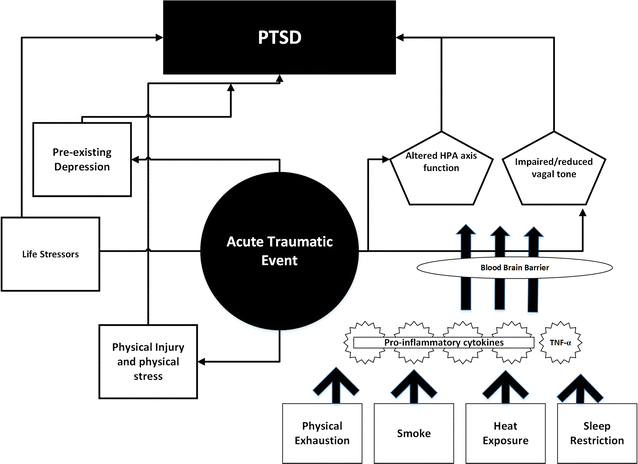Chronic occupational exposures can influence the rate of PTSD and depressive disorders in first responders and military personnel
- PMID: 27429749
- PMCID: PMC4947320
- DOI: 10.1186/s13728-016-0049-x
Chronic occupational exposures can influence the rate of PTSD and depressive disorders in first responders and military personnel
Abstract
Background: First responders and military personnel experience rates of post-traumatic stress disorder (PTSD) far in excess of the general population. Although exposure to acute traumatic events plays a role in the genesis of these disorders, in this review, we present an argument that the occupational and environmental conditions where these workers operate are also likely contributors.
Presentation of the hypothesis: First responders and military personnel face occupational exposures that have been associated with altered immune and inflammatory activity. In turn, these physiological responses are linked to altered moods and feelings of well-being which may provide priming conditions that compromise individual resilience, and increase the risk of PTSD and depression when subsequently exposed to acute traumatic events. These exposures include heat, smoke, and sleep restriction, and physical injury often alongside heavy physical exertion. Provided the stimulus is sufficient, these exposures have been linked to inflammatory activity and modification of the hypothalamic-pituitary axis (HPA), offering a mechanism for the high rates of PTSD and depressive disorders in these occupations.
Testing the hypothesis: To test this hypothesis in the future, a case-control approach is suggested that compares individuals with PTSD or depressive disorders with healthy colleagues in a retrospective framework. This approach should characterise the relationships between altered immune and inflammatory activity and health outcomes. Wearable technology, surveys, and formal experimentation in the field will add useful data to these investigations.
Implications of the hypothesis: Inflammatory changes, linked with occupational exposures in first responders and military personnel, would highlight the need for a risk management approach to work places. Risk management strategies could focus on reducing exposure, ensuring recovery, and increasing resilience to these risk contributors to minimise the rates of PTSD and depressive disorders in vulnerable occupations.
Keywords: Cytokines; Firefighters; IL-6; Inflammation; Military; Mood disorders; Sickness behaviour.
Figures
References
LinkOut - more resources
Full Text Sources
Other Literature Sources
Research Materials


